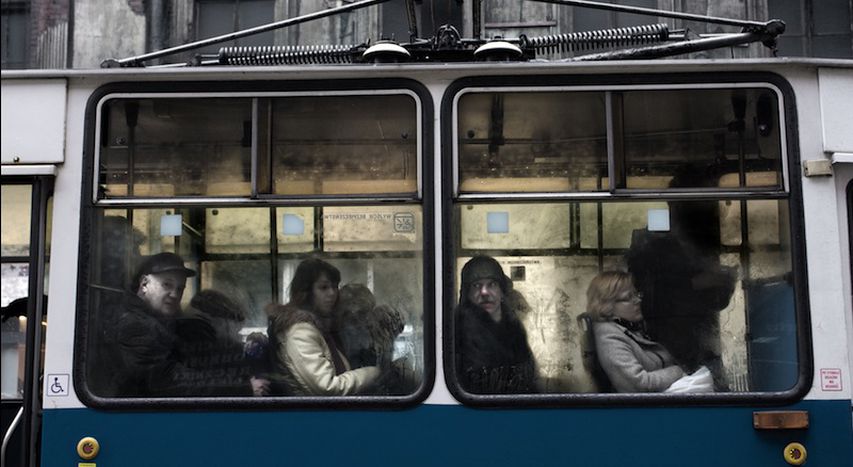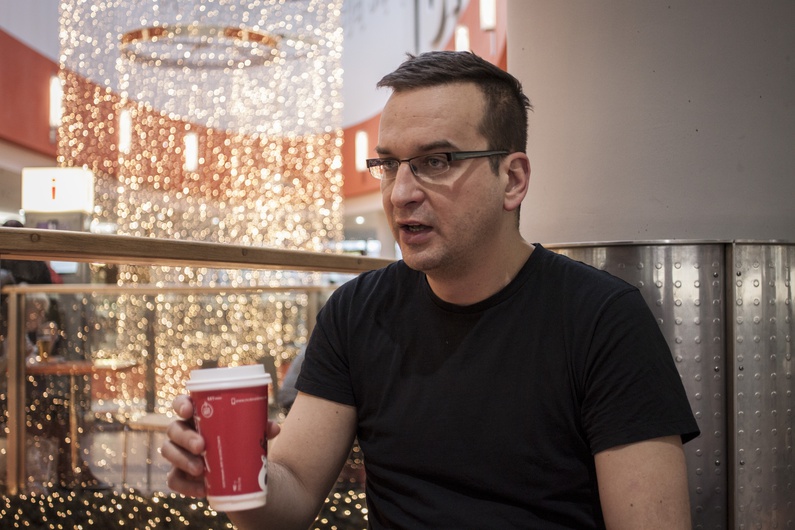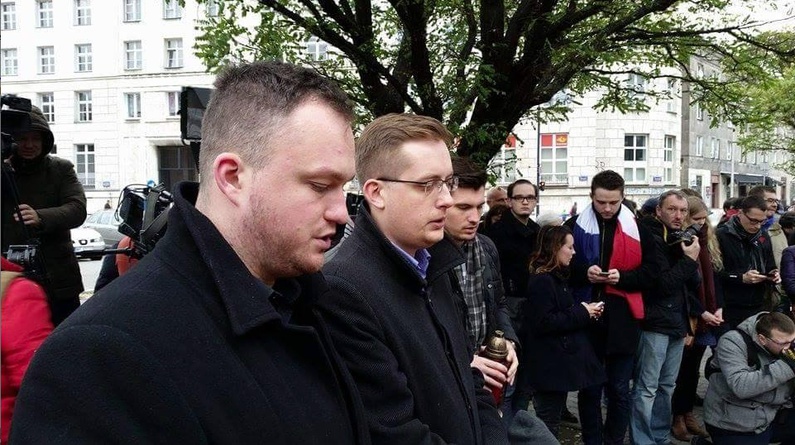
Krakow: A portrait of Islamophobia in Poland
Published on
Translation by:
Joshua EvangelistaIt’s not just a few Poles who fear an "Islamisation" of their country – just a quarter of the population say they are open to Muslims. Yet in Catholic Krakow – a city of 761,000 inhabitants – a few hundred individuals still pray to Allah. To get a better picture of the situation, we met those who say “No” to this welcome, as well as those who fight against this nationalist drift.
A few hundred meters from the elegant Rynek Główny – the main square of Krakow's old town –a group of Indian gentlemen shoot confused looks towards a yellow building. They are in the city for business and, as it is Friday, were hoping to pray. A few days ago they researched the address of a mosque on the Internet, hoping to visit. All they found upon arrival was an unassuming building with a locked doorway.
After a short wait, an Arabic man opens the door and they follow him inside. They traverse a series of narrow corridors down to the basement, eventually reaching a dark, wet room in which a dozen or so people are praying.
This is the main place of worship for the Muslims of Krakow. The Islamic Centre decided to remove its signage after a recent increase in the rate of attacks, such as the offensive graffiti left outside the Mosque some months prior. The authors of the Islamophobic sentiment referred to the Austro-Turkish war that took place in Vienna in 1683, when Poland fought against the Ottomans. They are hoping for another such defeat of Muslims.
Two sides to every story
 Krakow is experiencing a climate of increased fear, with an escalation of racist acts and xenophobia. "You do, bluntly, understand that you're not welcome," explains Ibrahim, an Egyptian tour-guide who moved to Poland after the beginning of the Cairo clashes in 2011. He hopes that the situation in Egypt will soon stabilise, so he can go back to his country and "avoid my children growing up in a climate of suspicion."
Krakow is experiencing a climate of increased fear, with an escalation of racist acts and xenophobia. "You do, bluntly, understand that you're not welcome," explains Ibrahim, an Egyptian tour-guide who moved to Poland after the beginning of the Cairo clashes in 2011. He hopes that the situation in Egypt will soon stabilise, so he can go back to his country and "avoid my children growing up in a climate of suspicion."
After the Paris attacks on the 13th of November, Łukasz Wantuch – a councillor in one of Krakow's districts – organised a sit-in along with another activist. The aim was to be a response to a large anti-refugee rally organised by right-wing parties. "I thought," Łukasz explains, "that the right thing to do was to ask my fellow-citizens to stand together against islamophobia, and to not confuse refugees with terrorists.
“I sent a call to my e-mail contacts asking them if they were interested in organising a procession together. The majority of them did not have the heart; they were afraid that they would be beaten by far-right sympathisers. In the end we were less than 25, while the rally against immigrants was attended by a huge number of people.
"We were terrified, the police had to escort us. Even my ex-wife implored me not to do it, she was afraid for me," he smiles for a second, quickly returning to his serious expression, "We were planning to organise various activities in schools about welcoming refugees, but now we cannot. It would be crazy. We have to wait for better times."
One of the main organisations campaigning against refugees in Krakow is the local division of Mlodziez Wszechpolska, a nationalist group affiliated with Ruch Narodowy (National Movement). I meet Szymon Kasinski, an IT engineer, and one of their local leaders, in a downtown cafe.
"Where there is no ethnic homogeneity there is terrorism." This seems a personal mantra to Szymon, as he repeats the sentence several times during the interview: "Look at France and Belgium, in those countries the initial welcome has turned into terrorism. We will not allow this to happen in Poland."
 His party organizes para-military training and dreams of a geopolitical alliance with Hungary, Slovakia and Romania. Its social model is similar to Victor Orbán's brand of Hungarian nationalism. When I ask what he thinks of the thousands of his young compatriots who are leaving Poland each year – according to the Daily Mail, the UK is now home to almost as many Poles as Krakow – he closes the matter by stating: "Our wish is to work and then come back to make Poland stronger, not to establish a caliphate."
His party organizes para-military training and dreams of a geopolitical alliance with Hungary, Slovakia and Romania. Its social model is similar to Victor Orbán's brand of Hungarian nationalism. When I ask what he thinks of the thousands of his young compatriots who are leaving Poland each year – according to the Daily Mail, the UK is now home to almost as many Poles as Krakow – he closes the matter by stating: "Our wish is to work and then come back to make Poland stronger, not to establish a caliphate."
"Something is going seriously wrong"
The position of the Mlodziez Wszechpolska movement is not just supported by a minority niche of society. According to a 2015 study about attitudes towards Islam in Poland, "over two-fifths of Poles (44%) express a cold attitude, while only a quarter (23%) have warm feelings towards them.” An absurd position, especially in Krakow, a city of 761,000 inhabitants among whom just few hundreds are Muslims.
No wonder that only one-eighth of adults (12%) personally know at least one Muslim. In addition, according to the research the majority of respondents associated Islam with violence: 57% think that this religion encourages violent actions.
"Something is going seriously wrong," explains a local Amnesty activist who prefers to remain anonymous, "and the scariest thing is that the Holocaust was perpetuated just 60 kilometres from here."
"The community of Krakow has been broken into two parts," says Adam Bulandra, one of the leaders of the Interkulturalni Festival, a local event which showcases arts and culture from all over the world, “There is a huge cultural apathy – thousands of people are politically and socially passive.”
Konrad Pedziwiatr is an assistant professor at Krakow University and an expert on Muslims in Europe, social movements, and the sociology of migration. He believes that the campaign against Muslims is paradoxical, as the Tatars, a Sunni Muslim minority that has been present in Poland since 1300, are perfectly integrated with the rest of the population.
Konrad also points a finger at the media: "Isis atrocities compel the media to cover Middle East affairs, but journalists are often unprepared and lack the appropriate knowledge. It affects the agenda and in turn those who consume the news. To cut a long story short, we could say that Muslims in Poland are the new Jews."
Because many Muslims are afraid to leave their houses alone, some consider their faith a source of pride. 20-year-old Kamila Dudkiewicz converted to Islam after volunteering with refugees in Jordan. "After my conversion I lost over 400 friends on Facebook," she says, "But I do not care. Often my friends ask me if I want to end up burned alive like Afghan women. There is so much ignorance about Islam; but I'm brave and I want to let the citizens of Krakow know the true face of my religion."
When I ask if she sees herself staying in Krakow in the future however, her answer surprises me: "Definitely not. I will leave Poland. I want to travel and live in a country where Muslims are not seen as a bunch of terrorists."
---
This feature report is a part of our EUtoo 'on the ground' project in Krakow, seeking to give a voice to disenchanted youth. It is funded by the European Commission.

Translated from Cracovia: un viaggio attraverso l'islamofobia della Polonia



